- The Manchester attack could have been stopped, the UK home secretary revealed on Tuesday.
- MI5 had planned to discuss intelligence on bomber Salman Abedi, but the meeting was scheduled nine days after the attack took place.
- Abedi killed 22 people in a suicide attack at Manchester Arena in May.
British security authorities could have stopped the Manchester attack “had the cards fallen differently,” the UK’s home secretary has said.
Amber Rudd told the House of Commons that the suicide bomber, Salman Abedi, had been under investigation at the time of the attack, but the intelligence on him had been assessed as not related to terrorism.
Rudd said: “It is conceivable that the attack might have been averted had the cards fallen differently.”
Rudd’s comments came after David Anderson QC published an independent report on the British response to four terror attacks this year.

According to Anderson's report, Abedi was a closed subject of interest at the time of the attack - meaning he had been previously investigated by MI5 but was later deemed no longer a threat to national security.
Months before the attack, however, MI5 received intelligence on Abedi, and a separate MI5 programme flagged him as "one of a small number of individuals... who merited further examination."
Officials planned to discuss intelligence on Abedi on May 31 - nine days after the atrocity took place. Twenty-two people died in Abedi's suicide attack on an Ariana Grande concert at Manchester Arena in May.
"On two separate occasions in the months prior to the attack, intelligence was received by MI5 whose significance was not fully appreciated at the time. It was assessed at the time to relate not to terrorism but to possible non-nefarious activity or to criminality on the part of Salman Abedi," Anderson said in his report.
"In retrospect, the intelligence can be seen to have been highly relevant to the planned attack."
Anderson did not reach a decisive conclusion on whether the attack could have been stopped.
He explained that MI5 had decided, "on the clear balance of professional opinion," that reopening an investigation into Abedi would not have pre-empted the attack.
Anderson added, however, that "an opportunity was missed by MI5" to flag Abedi as a potential terror suspect during his travels to Libya before the attack. Abedi was in Libya between April 15 and May 18, or four days before he killed 22 people.
Placing Abedi on ports action "would have triggered an alert when he returned shortly before the attack, which could have enabled him to be questioned and searched" by police under the UK's Terrorism Act, Anderson wrote.
Terror attacks on the UK
Britain has suffered five terror attacks this year, killing 36 in total. Anderson's examined each attack listed below with the exception of Parsons Green, which took place after the report was commissioned.
March 22: Westminster - Khalid Masood drove a car into pedestrians on Westminster Bridge before stabbing police officer Keith Palmer to death in the grounds of Parliament. Four others died.
May 22: Manchester - Salman Abedi detonated a suicide bomb after an Ariana Grande concert at Manchester Arena. He killed 22 people, including children.
June 3: London Bridge - Khuram Shazad Butt, Rachid Redouane, and Youssef Zaghba drove a van into pedestrians on London Bridge before launching a stabbing spree in Borough Market. Eight were killed.
June 19: Finsbury Park - Darren Osborne is suspected of driving his van into a crowd of Muslim worshippers in north London. One man died after the attack.
September 15: Parsons Green - An improvised bomb exploded on a London Underground train. The bomb malfunctioned and passengers escaped with minor injuries. Ahmed Hassan has been charged with attempted murder.

